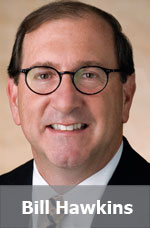 A few months into his tenure as CEO of Medtronic, Bill Hawkins faced “probably the toughest decision of my life.” Concerns had been raised about the potential failure rate of an implantable defibrillator made by the medical device manufacturing company and whether to voluntarily recall the device—one of Medtronic’s largest product lines—fell to Hawkins.
A few months into his tenure as CEO of Medtronic, Bill Hawkins faced “probably the toughest decision of my life.” Concerns had been raised about the potential failure rate of an implantable defibrillator made by the medical device manufacturing company and whether to voluntarily recall the device—one of Medtronic’s largest product lines—fell to Hawkins.
“It was not black and white,” he recounts. “It was all statistics and probabilities—not that we had had [a significant number] of failures. Plus, we had to consider the risk of people whose lives depend upon the device getting concerned and wanting to have it extracted, which could have a higher mortality risk than leaving it in.”
Ultimately, Hawkins, 55, opted to issue the product recall, in the process shrinking the company’s share of the implantable cardiac device market from approximately 53 percent to 47 percent. While Medtronic still hasn’t fully recovered from the move—its stock price languishes close to its 10-year low—he has no regrets. “It’s been tough and it cost the company, but we did the right thing,” says Hawkins.
Even before that setback, Medtronic faced its share of growth challenges. Known as a pioneer in healthcare technology, the company enjoyed leading positions in both cardiac rhythm disease management (pacemakers, implantable defibrillators and related products) and spinal and biologics (medical devices and bone growth substitutes), as well as strongholds in other markets, including cardiovascular, neuromodulation and diabetes. But it had reached a size—$12 billion at the time—and scale where the 15 percent top-line growth it was known for would be tougher to deliver, particularly at a time of slowing economies and pressure on healthcare costs.
“The challenge is what is the next act?” says Hawkins, who goes on to describe a plan for redefining both the company and the markets within which it plays. “Historically, we’ve been viewed as, let’s say, a pacemaker company or stent company. My goal is to be recognized as more than a device company—as a pioneer and innovator in chronic diseases like heart failure, diabetes or degenerative disc disease.”
As an example, Hawkins cites Medtronic’s Paradigm Veo pump, a new insulin pump that continuously monitors and displays a diabetic’s glucose levels so that diabetics can make appropriate adjustments, and will automatically halt insulin delivery when glucose levels are too low. The company now plans a monitoring patch that incorporates a radio capable of transmitting instructions for the pump to increase or decrease insulin delivery. “What’s unique about what we’re doing is the ability to provide people with a combination of tools, technology and information to help them better manage their diseases,” he says, adding that diabetes and neuromodulation are areas with “huge headroom.”
Accounting for $1.434 billion of Medtronic’s $14.599 billion fiscal year 2009 revenue, neuromodulation, or the use of deep brain stimulation to address chronic diseases, is a rapidly expanding field that offers great growth potential. Already, Medtronic’s neurostimulation systems and implantable drug delivery systems are used to treat chronic pain, common movement disorders such as Parkinson’s, and urologic and gastrointestinal disorders. “The next big area is in psychiatric disorders, such as treatment-resistant depression or obsessive compulsive disorder,” explains Hawkins. “We now know where those targets are in the brain and can put our tiny leads in, turn them on and bring the patient back to normal.”
Despite such advancements, a cloud looms on Medtronic’s horizon: the changes healthcare reform will bring. But Hawkins is undaunted. “We have got to go down this road of healthcare reform,” he says. “For 60 years this company has navigated incredible twists and turns. While I can’t suggest we’re not worried about what is happening, ultimately our mission is to make sure that anybody who needs what we do gets access to what we do. As long as we are successful in treating patients, we will be successful as a business.”

Chief Executive Group exists to improve the performance of U.S. CEOs, senior executives and public-company directors, helping you grow your companies, build your communities and strengthen society. Learn more at chiefexecutivegroup.com.
0

1:00 - 5:00 pm
Over 70% of Executives Surveyed Agree: Many Strategic Planning Efforts Lack Systematic Approach Tips for Enhancing Your Strategic Planning Process
Executives expressed frustration with their current strategic planning process. Issues include:
Steve Rutan and Denise Harrison have put together an afternoon workshop that will provide the tools you need to address these concerns. They have worked with hundreds of executives to develop a systematic approach that will enable your team to make better decisions during strategic planning. Steve and Denise will walk you through exercises for prioritizing your lists and steps that will reset and reinvigorate your process. This will be a hands-on workshop that will enable you to think about your business as you use the tools that are being presented. If you are ready for a Strategic Planning tune-up, select this workshop in your registration form. The additional fee of $695 will be added to your total.

2:00 - 5:00 pm
Female leaders face the same issues all leaders do, but they often face additional challenges too. In this peer session, we will facilitate a discussion of best practices and how to overcome common barriers to help women leaders be more effective within and outside their organizations.
Limited space available.

10:30 - 5:00 pm
General’s Retreat at Hermitage Golf Course
Sponsored by UBS
General’s Retreat, built in 1986 with architect Gary Roger Baird, has been voted the “Best Golf Course in Nashville” and is a “must play” when visiting the Nashville, Tennessee area. With the beautiful setting along the Cumberland River, golfers of all capabilities will thoroughly enjoy the golf, scenery and hospitality.
The golf outing fee includes transportation to and from the hotel, greens/cart fees, use of practice facilities, and boxed lunch. The bus will leave the hotel at 10:30 am for a noon shotgun start and return to the hotel after the cocktail reception following the completion of the round.